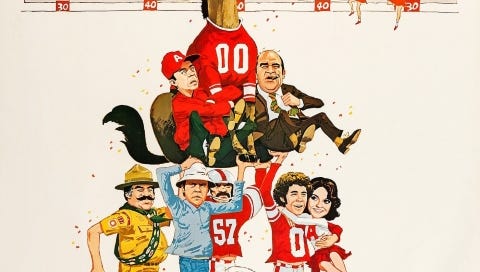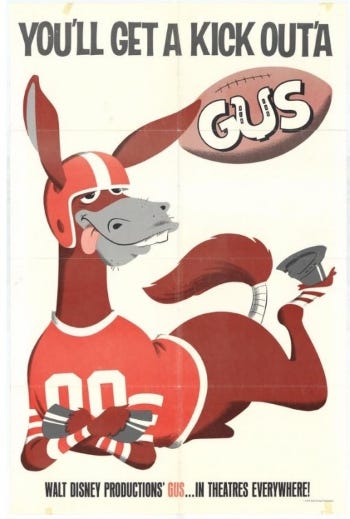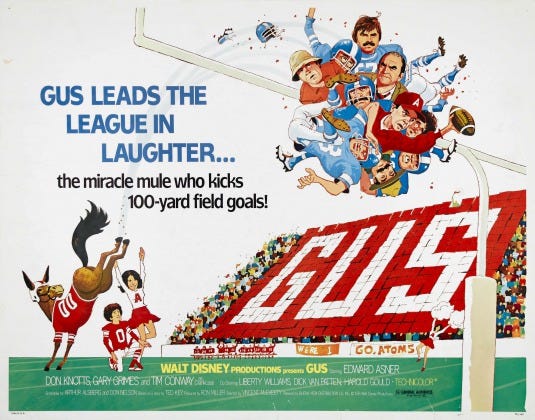During the Golden Age of the Hollywood Studio System, it was not unusual for directors to have their names on multiple movies over the course of a single year. By 1976, those days were mostly a relic of the past. Everywhere, that is, except at Disney. The Mouse House still relied heavily on the contract system, employing full-time producers, writers, directors, and stars that they liked to keep as busy as possible. But even by Disney’s assembly-line standards, it’s impressive that director Vincent McEveety had two fairly big movies, Treasure Of Matecumbe and Gus, released within a week of each other in July of ’76. Nobody ever accused the McEveety brothers of laziness, that’s for sure.
Gus reunited McEveety with cartoonist Ted Key, who had come up with the idea for McEveety’s first Disney feature, The Million Dollar Duck. Key’s pitch about a football-kicking mule landed on the desk of the exact right producer. Ron Miller had played for the Los Angeles Rams back in 1956 until his father-in-law, Walt Disney, asked him to consider a profession with less risk of concussion. He had experience with the sport and with producing goofball comedies. His first credit as a full producer had been The Misadventures Of Merlin Jones. Comedies don’t get much goofier than that. Most importantly, he had connections in the NFL. Judging by the number of cameos from real football players and sportscasters, Miller called in a lot of favors on Gus.
Key’s story was turned into a screenplay by Arthur Alsberg and Don Nelson, the team responsible for No Deposit, No Return. Given that connection, it was inevitable that Don Knotts, already a Disney favorite after just two movies, would appear in Gus. His Apple Dumpling Gang costar, Tim Conway, is here too but they don’t share so much as a single scene together. That’s a little disappointing but it makes sense for reasons I’ll get into in a moment.
Instead of Conway, Knotts is paired with top-billed Ed Asner, who at the time was nearing the end of his seven years as Lou Grant on The Mary Tyler Moore Show (which led to five more years as Lou Grant on the spin-off of that name). Surprisingly, Asner didn’t do much work for Disney beyond this movie. In 1986, he starred in the Disney TV-movie The Christmas Star and, of course, he would years later provide the voice of Carl Fredricksen in Pixar’s straight-up masterpiece Up. I suppose his prolific TV work in the 1970s kept him busy enough that he didn’t really need to moonlight in Disney comedies.
In a lot of ways, the structure and premise of Gus isn’t all that different from Disney’s last sports-themed comedy, The World’s Greatest Athlete. Once again, a last-place team recruits a prodigy from a foreign country to save the franchise. But there are some differences beyond the prodigy’s species. And almost all these tweaks improve on the general formula. Yes, even changing the athlete from a human to a mule is an improvement.
Instead of starting with the coaches, Gus begins its story focused on our young protagonist at home in Yugoslavia (not Africa, another improvement over The World’s Greatest Athlete). Gary Grimes stars as Andy Petrovic, a physically awkward farm boy constantly overshadowed by his soccer star older brother (Jackson Bostwick, the original star of the live-action Saturday morning show Shazam!). Frustrated by having to compete for his father’s respect, Andy tosses a soccer ball to his mule, Gus, who sends it soaring with a powerful kick. Andy sets up another ball and discovers Gus consistently sends balls into the stratosphere on command.
Meanwhile in the good old U S and A, Hank Cooper (Asner), the beleaguered owner of the last place California Atoms, is reviewing some pretty hilarious films of his team’s ineptitude with Coach Venner (Knotts). The team is a total washout, the marching band can’t play and the cheerleading squad, the Atomettes, is a ragged-looking bunch of women approaching retirement age. So when Cooper’s secretary, Debbie (Liberty Williams), brings in an article about Gus from a newspaper her Yugoslavian parents read, he’s desperate enough to give the mule a shot as a half-time attraction just to fill the stands.
After Gus helps Andy get over some opening day jitters, the boy and his mule turn out to be a hit in the pre-season. But Cooper is still in over his head with gambling debts to bookies Charles Gwynn (Harold Gould from The Strongest Man In The World taking over the Keenan Wynn role) and Cal Wilson (Disney regular Dick Van Patten). So Cooper bets that if the Atoms can’t win half their regular season games, he’ll hand the team over to Gwynn. Those odds aren’t good enough for Gwynn. He’ll agree to the wager but only if the Atoms go all the way to the Super Bowl and win. With no other alternative, Cooper takes the bet.
As expected, the Atoms are on track to lose their first official game of the season. With the fate of the team at stake, Cooper sends Gus and Andy in as players to attempt a field goal. After a quick check of the rule book, the ref decides the NFL doesn’t specify that a player needs to be human. In later years, this would be known as the Air Bud Clause. Gus makes the kick and the Atoms finally break their losing streak.
Gwynn and Wilson are none too happy about this turn of events. So Wilson contacts a pair of career criminals newly released from prison, Crankcase (Tim Conway) and Spinner (Happy Days star Tom Bosley in his only Disney appearance). They’re crooks but they’re not monsters, so their schemes to delay or incapacitate Gus and/or Andy are relatively harmless. Crankcase steals a horse trailer and disguises himself as a driver to prevent them from showing up to a game. Spinner sneaks into the stable to get Gus drunk. You know, good clean shenanigans like that.
As for Andy, he’s become a bit of a celebrity in his role as an unlikely football star. But a TV interview with his family back in Yugoslavia proves that his dad still thinks just as little of him as ever. He keeps trying to steer the conversation back to his other son, a real hero, while dismissing Andy’s accomplishments as just being the guy who holds the ball for the mule to kick.
Andy and Debbie have also fallen in love, much to the displeasure of Debbie’s ex, Atoms player Rob Cargill (former Chicago Bears linebacker Dick Butkus). Rob tries to take Andy out of the picture a few times (including once at a drive-in where he ends up running into Richard Kiel, about a year away from his debut as classic Bond villain Jaws). During the division playoffs, Rob’s jealousy gets the better of him and he tries tackling Andy mid-game. Gus protects his buddy, landing Rob both in the hospital and on another team after Cooper trades him.
For their next trick, Spinner and Crankcase change tactics and try to get Andy out of the picture. Disguised as a doctor, Spinner tells him that Debbie’s been in a terrible accident and desperately needs a blood transfusion. Andy is rushed to the hospital, stripped of his clothes and locked in a room with Crankcase standing guard. Meanwhile, the Atoms look bound for defeat when Gus refuses to kick for anyone but Andy.
Andy escapes from the hospital (after hiding behind an X-ray machine, resulting in a terrific little animated gag involving Andy, Spinner and a random cat) and makes it to the stadium but it’s too late. The Atoms have already won the game thanks to Debbie, who took advantage of Cooper’s anybody-who-can-find-a-uniform-can-play policy to (A) break new ground as the NFL’s first female player, not that anybody mentions that, and (B) sweet-talk Gus into winning the game for Andy’s sake. But instead of gratitude, Andy slumps into a deep depression. Debbie seems to have proven his father’s point. He really is just the guy who holds the ball and apparently anybody can do that.
Despite the fact that literally everyone who just watched that game can (and does) tell him the exact opposite, Andy is ready to pack it in and go back to Yugoslavia. Debbie makes her way through throngs of adoring fans at the airport to beg him to reconsider. Somehow she’s able to get Andy past a lifetime of self-loathing and he agrees to return to Cooper for the Big Game. Yes, the team that can only score with field goals has made it into the Super Bowl. Cooper orders Andy and Gus to lay low until the big day.
But Spinner and Crankcase have one last trick up their sleeves: the old switcheroo. They mule-nap Gus and replace him with a regular old American mule with a paint job. The bad guys hole up in a motel to watch the game on TV but when Gus hears Andy give the command, he goes nuts. He easily breaks out and leads the crooks to a Ralph’s supermarket that they then spend seemingly half the movie destroying.
Realizing they’ve got the wrong mule, Cooper and Andy board a helicopter to search for Gus. Eventually they spot him in the Ralph’s parking lot and airlift him back to the stadium. There’s time for one last play and Rob, now playing for the opposing team, intends to make it Andy’s last play ever. Instead of kicking the ball, Gus lays down in the muddy field, sending Rob sprawling and leaving Andy to pick up the ball and run with it. Andy makes the epic play and finally becomes the hero his father wanted.
I’m going to be honest with you. I was not looking forward to Gus. Oh, a lot of reasons, I suppose. Vincent McEveety’s previous efforts in this genre, including Million Dollar Duck and Superdad, left a lot to be desired. And there’s the fact that this is a movie about a mule that kicks footballs. But y’know what? Gus made me laugh. On purpose. And more than once. That’s all a movie like this needs to accomplish, really.
Is Gus a perfect movie? Oh, merciful heavens, no. It is, after all, a movie about a mule that kicks footballs. McEveety still doesn’t believe it’s better to leave an audience wanting more. There isn’t a gag or sequence that isn’t stretched well past its breaking point. And I’ve seen better green screen effects on the local weather report. But the movie delivers where it counts.
A lot of the credit for this goes to the very game cast. Everyone commits fully to the absurdity of it all without a hint of condescension. Grimes doesn’t put a whole lot of effort into whatever Eastern European accent he’s attempting but he injects Andy with more genuine heart than he probably needed to. Gus ended up being one of Grimes’ last films. After making a big splash early in his career in the 1971 sleeper Summer Of ’42, Grimes grew increasingly disillusioned with show business and quit not long after the release of Gus. He’s still alive, living a normal life out of the spotlight. Good for him.
If anything, Gus could benefit from giving Don Knotts a bit more to do. He gets second billing but has less screen time than in either of his earlier Disney movies. I imagine there was an impulse to cast Knotts as Spinner opposite Tim Conway. I’m glad they resisted that urge. Tom Bosley is genuinely funny in the role, playing way against his Mr. Cunningham type, and he works well with Conway. And Bosley wouldn’t have worked in Knotts’ part as Coach Venner. He and Ed Asner have too similar an energy to make an effective comic duo.
Gus also marks the temporary return of Superdad star Bob Crane as motormouthed, know-nothing sportscaster Pepper Allen. Paired in the booth with real-life NFL star Johnny Unitas as himself, the old Pepper Pot is a much better showcase for Crane than his last Disney gig. It’s a gag we’ve seen before but Crane and Unitas perform it well. This would be Bob Crane’s last appearance in a feature film. On June 29, 1978, Bob Crane was murdered in Scottsdale, Arizona. The crime officially remains unsolved. If you’re interested in theories and the gory details, there are plenty of more appropriate places to find them than a review of Gus.
To the surprise of no one, probably even the folks who made it, Gus was not warmly embraced by critics. A few gave it sort of a polite smile, patting it on the head and saying kiddies might like it, but most were tired of this formula. Audiences weren’t, not yet anyway. Gus did fairly well at the box office, just barely cracking the top 20 on Variety’s year-end wrap-up. 1976 was a rough year for Disney but Don Knotts helped see them through.
I’m at a loss to explain why I enjoyed Gus when so many similar movies caused me to risk permanent optic nerve damage from rolling my eyes so hard. Maybe it’s the gift of low expectations. Maybe it’s some form of Disney-induced Stockholm Syndrome that’s wearing me down. Or maybe, just maybe, Gus is a goddam masterpiece that should have won all the Oscars. The world may never know.
VERDICT: God help us all, it’s a Disney Gus…I mean, Plus.
Like this post? Help support Disney Plus-Or-Minus and Jahnke’s Electric Theatre on Ko-fi!







It may have been Bosley’s only on screen Disney role, but he’d work for the company again when he originated the role of Maurice in the original Broadway and LA casts of Beauty and the Beast.